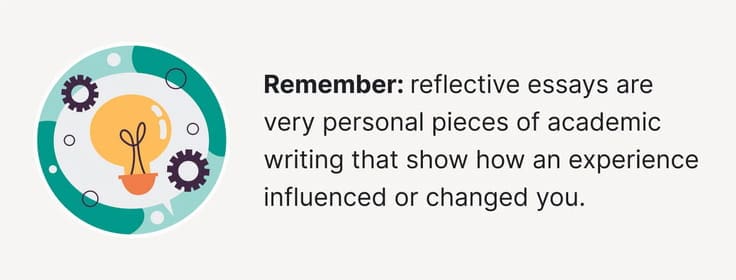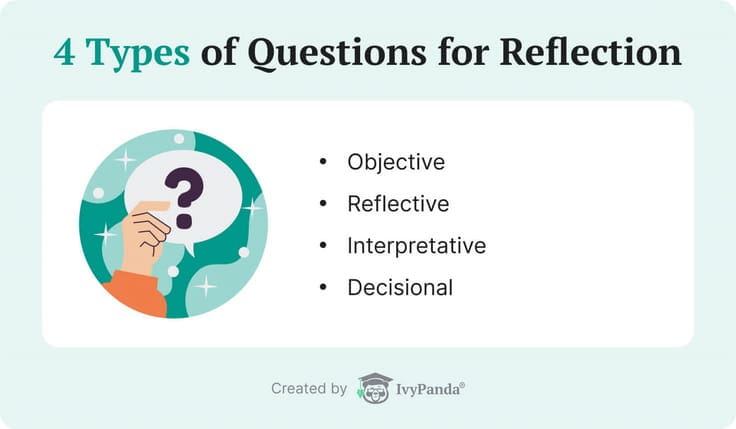Reflection Paper Maker for Students
College students are often faced with writing a reflection paper. It's a great way of learning and comprehending a subject. This type of writing is so multipurpose that you can get this assignment in biology, history, literature, or any other subject.
If you are here, you most likely need assistance with this type of essay. Take advantage of our free reflection paper maker and familiarize yourself with useful tips on this page.
Let's make your work successful and persuasive!
✏️ Introduction to Free Reflection Paper Maker
Reflection paper is an essential type of academic writing that allows people to analyze their experiences and share their thoughts about something. Writing such a paper can be challenging since it requires in-depth analysis and critical thinking.
To help you simplify this task, the IvyPanda.com team has developed a reflection paper generator: an AI-based online tool that will inspire you with ideas and save you time. We've also included a writing guide and practical tips to help you ace your task. Check it out!
🔍 Why Use a Reflection Paper Maker Free Tool?
You can benefit from our reflection essay generator in many ways. Here are its advantages:
Reflection Paper Maker Online: How to Use
Follow these five easy steps to generate your essay sample:
- Indicate your assignment type.
- Specify your topic.
- Provide some context.
- Mention the lessons learned.
- Click the “Make Reflection Paper” button.
Feel free to use the reflection paper sample to write your own essay. We recommend checking the results with our GPT Essay Checker to ensure your writing is 100% original.
❓ What Is a Reflection Paper?
A reflection paper is an essay in which students discuss their thoughts on a particular topic or experience. For example, you can write it to express your opinion on a journal article, lecture, or movie.

A reflection paper may also be assigned to you by an employer. Such tasks are typically given out at the pre-interview stage to judge a candidate’s competency and gain insight into their character, personal qualities, and life experiences.
✍ How to Write a Reflection Paper Step by Step
Now, let’s see how to write a fantastic reflection paper on any topic. Follow these steps, and you’ll surely succeed:
-
Explore and summarize.
The first step is to gather the materials you will be working with and study them thoroughly. You can take notes or write a brief draft of the main points you are interested in. -
Choose a title.
Think about a title that will describe your topic best. You can use our AI online topic generator to avoid getting stuck. -
Analyze the content.
Formulate your thesis statement and arguments based on what you’ve read. Additionally, consider how you will present facts that support your analysis. -
Establish connections.
Make an outline showing how your arguments connect with each other and in what order. It’ll serve as a good template for your reflection paper. -
Write your paper.
Develop each paragraph of your essay using your outline. Start with an introduction and a thesis statement. After that, state your ideas and analyze arguments in the body paragraphs. End with a persuasive summary in the conclusion. -
Proofread and edit.
Take your time to polish your work properly. Doing so will ensure the best quality and success of the paper. Eliminate any logical or grammatical mistakes, and format your paper according to your school’s guidelines.
Reflection Paper Outline
Here’s a pro tip: always start your writing process with an outline. It will help you structure your arguments and make your reflection paper more persuasive.
Let’s examine each essay component in detail:
- Introduction. At the beginning of the paper, you should specify the topic, the subject of analysis, the discussion points, and the thesis statement. It's also worth including a brief description of the analyzed content.
- Body paragraphs. The main body may consist of several paragraphs, usually two to four. This is where you review your thesis in depth. Provide convincing arguments, quotes, examples, and references. You can also share your own relevant experience. Finish each paragraph with a transition to the following section.
- Conclusion. In your essay’s final paragraph, you need to draw conclusions that you came to in the process of reflection. Summarize your arguments, restate your paper’s main idea, and leave your readers with a thought-provoking closing statement.
What Are the 4 Types of Questions for Reflection?
To develop your reflection, you can answer four types of questions: objective, reflective, interpretative, and decisional.

Here’s what their goals are:
👍 7 Beneficial Tips for Writing a Personal Reflection Paper
Check out our helpful tips below to take your reflection writing to the next level:
-
Mind the length.
Stay clear and concise in your statements. Remember that the paper's length should be around 250 to 800 words. -
Describe your thoughts openly.
To make an excellent reflection paper, you should be fearless in formulating your thoughts. Don’t worry about being wrong – the point here is to convey your reasoning and emotions about the subject. -
Use first-person narration.
This will help your readers perceive your opinion from your perspective. -
Don't focus solely on the good or bad aspects.
Instead of focusing exclusively on what you agree or disagree with, try to analyze the content from different angles. This way, you will demonstrate a balanced reflection. -
Cite quotations and sources.
Even though reflective essays imply that you are expressing your thoughts, you still need to find worthwhile arguments and examples. That’s why you need to cite the sources you reference according to the required citation style. -
Maintain the proper tone.
Even though you’re writing about personal experiences, this is an academic paper. Unlike a diary entry, a reflection essay requires you to maintain a formal tone. -
Format properly.
This will make your text flow logically and help your reader understand your point.
What Is an Example of Reflective Writing?
The best way to understand how to write a paper is to look at an example. Check out this list of top-notch reflection essays:
- Self-Reflection in Social Work
- Reflection on Global Issues: Globalization of the Environment
- Reflections on the Great Themes of the Bible and Challenge of Secularism
- Hamlet and Forgiveness: A Personal Reflection
- Journey to Nursing: A Personal Reflection on Passion, Influence, and Aspirations
Updated:
📎 References
- How to write a reflection paper – Royal Holloway University of London
- How to Write a Reflection Paper (With Steps and Examples) - Indeed Editorial Team, Indeed
- Reflective Practice Toolkit - Cambridge University Libraries
- General tips for academic reflections – The University of Edinburgh
- Critical Reflection – University of Waterloo